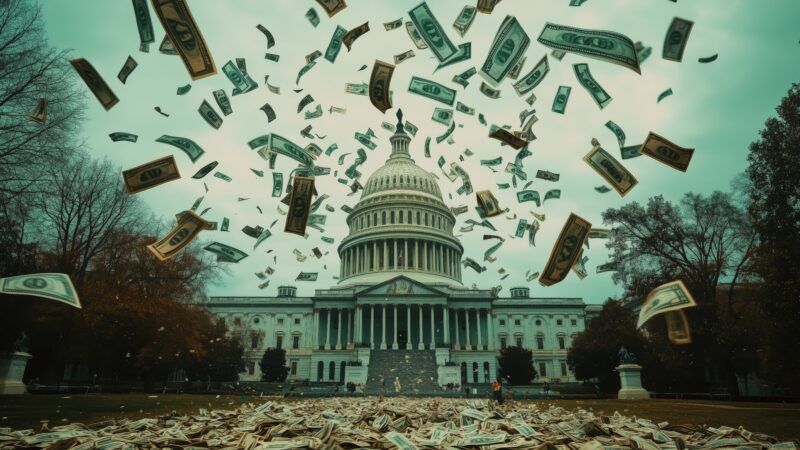The Government Shutdown Is a Distraction—From Our $37 Trillion Debt
This time, Democrats turned the most basic government housekeeping into hostage drama.

The federal government just accumulated an additional $2 trillion in debt over the last 12 months. That's the kind of debt surge America usually racks up in wartime or during major national emergencies. But today, as Republicans and Democrats engage in another budget-driven shutdown drama, we are not at war. There is no pandemic. The economy is humming. And another shutdown is happening. Yet it will solve nothing about the fact that the political class is burning through money at a pace that would make former President Franklin D. Roosevelt's war cabinet blush.
The Daily Treasury Statement shows total federal debt rising from $35.5 trillion last September to $37.5 trillion this week. In peacetime, with unemployment low and the stock market booming, that's breathtakingly reckless. Yet in Washington, winning at politics matters more than confronting the cause of the problem: relentless overspending, and especially the explosion of entitlement programs.
Republicans, despite their fiscal-hawk branding, have presided over much of this surge. They boast $206 billion in Department of Government Efficiency "savings" and $213 billion in tariff receipts—rounding errors when compared with the debt. As the Tax Foundation's Alex Durante and Garrett Watson point out, tariff revenue does almost nothing to change the country's fiscal trajectory.
Even if President Donald Trump collects every dollar of his "emergency" tariffs, the federal debt-to-gross-domestic-product (GDP) ratio would still climb above 124 percent by 2035. Remember that most of that revenue is paid by Americans, not foreigners—and that the tariffs' growth-dampening effects offset much of the revenue in the first place.
Democrats, for their part, are pushing back by demanding even more permanent spending. Senate Democrats just blocked a clean continuing resolution to simply carry forward former President Joe Biden's spending levels from December 2024. As a result, the government is shut down. Why? To leverage the threat, and now the pain, of a shutdown into $1.5 trillion in new entitlements, including making Obamacare emergency subsidy expansions permanent.
That's on top of subsidies already bloated to absurd levels. The Paragon Institute's Brian Blase notes that in 2014, taxpayers covered 68 percent of Obamacare premiums. By 2020, that figure had risen to 80 percent. With Biden's COVID-19–era credits, taxpayers now cover 93 percent of premiums.
This is just the tip of the spending iceberg. The Cato Institute's Chris Edwards tallied the full scope of Washington's handout empire: 2,623 benefit and subsidy programs now clutter the federal budget. In 1970, there were 1,019. In 2000, there were only 1,425.
The Department of Health and Human Services alone runs hundreds of welfare programs on top of Medicare and Medicaid. The Department of Agriculture runs not just farm subsidies but rural subsidies, food stamps, the WIC nutrition program, and school lunches.
Mix in hundreds of tax breaks designed as stealth entitlements, and the budget metastasizes into an octopus of subsidies. It's no wonder spending soars regardless of who's in charge.
The results are visible in the calendar as much as in the spreadsheets. This year, "Deficit Day"—when federal revenues collected since January 1 run out—fell on September 21. Every dollar spent after that date comes from new borrowing.
Antony Davies and James Harrigan, the authors of the Deficit Day calculation, liken it to a household that runs out of money a week before the end of every month and has done so for 25 straight years. Washington spends $19 billion a day. That's $7 trillion in 2025. Every penny from now until New Year's is piled on top of the $37 trillion debt.
Both parties are guilty. Republicans borrow recklessly and pretend tariffs or efficiency "savings" will square the books. Democrats demand still more entitlements, paid for with money we don't have. They use brinkmanship as a distraction, turning the most basic government housekeeping into hostage drama.
That's not reform. It doesn't shrink government. It doesn't impose discipline. It wastes more money while the unchecked growth of entitlement and subsidy programs goes unaddressed. The resolution carrying forward Biden's high spending numbers for seven weeks was far from ideal. But it was the least bad option: It would have avoided a shutdown, bought time, and not added new entitlements.
Either way, we still need a real solution. But it will require courage neither party has shown. Edwards says Congress should slash entitlements and comb the Federal Program Inventory to eliminate hundreds of low-value subsidies. Blase argues that Washington should roll back Obamacare subsidies and restore price discipline in health care. As Davies and Harrigan demonstrate, debt is no longer a "tomorrow" problem; it's already upon us.
For now, we're stuck with a government that borrows like it's fighting World War III while insisting that it's merely conducting business as usual.
COPYRIGHT 2025 CREATORS.COM
